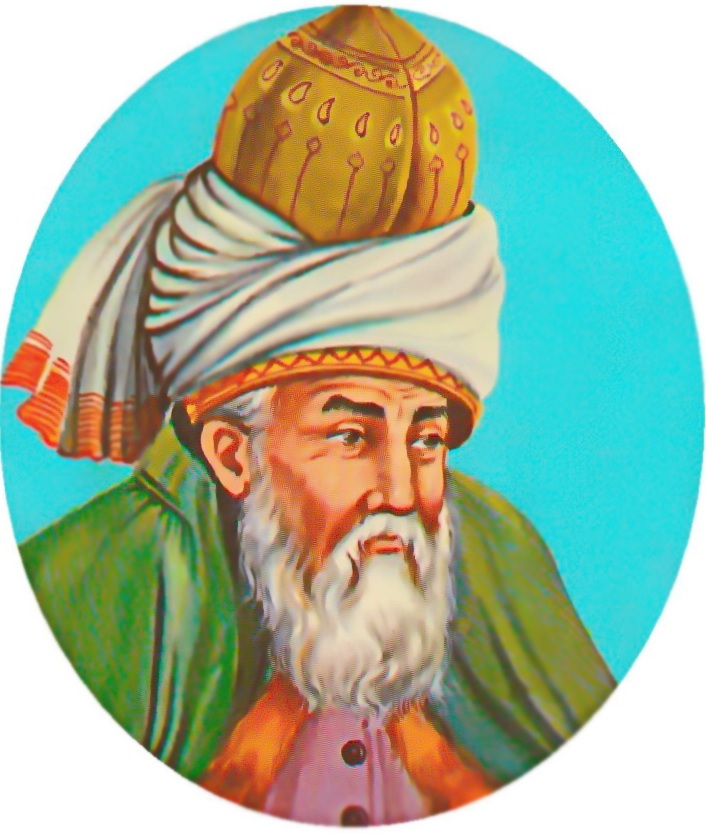There was a man in the 13th century who lived as a respected scholar and theologian, quietly teaching and leading a religious life. One day, he met a wandering mystic, Shams of Tabriz, and everything changed. This man would go on to become the greatest mystical poet the world has ever known, inspiring countless people with his verses on divine love and the unity of all existence. Jalal ad-Din Muhammad Rumi, commonly known as Rumi.

Early Life of Rumi
Rumi, was born on September 30, 1207, in the city of Balkh, located in present-day Afghanistan. However, some sources suggest that he might have been born in Wakhsh, a region in what is now Tajikistan. Rumi hailed from a family deeply rooted in Islamic scholarship and Sufism, which had a profound influence on his early upbringing and education. Rumi’s father, Baha al-Din Walad, was a well-respected Islamic scholar, theologian, and mystic, often referred to as the “Sultan of the Scholars.” His mother, Mumina Khatun, was believed to be of noble lineage. As a child, Rumi was exposed to the spiritual teachings of his father and to the broader world of Islamic scholarship, which shaped his intellectual and spiritual foundations.
The political climate in Central Asia during Rumi’s early years was tumultuous due to the Mongol invasions sweeping across the region. Fearing the destructive force of the Mongols, Rumi’s family left Balkh around 1216 when Rumi was still a young boy. They embarked on a long journey, traveling through various cities, including Baghdad, Nishapur, and Mecca, where they performed the pilgrimage (Hajj).
During this journey, they visited notable scholars and mystics, further enriching Rumi’s exposure to various intellectual traditions. It was in Nishapur where the family met the famous Persian poet and mystic Farid al-Din Attar, who recognized young Rumi’s potential. Attar is said to have gifted Rumi a copy of his poetic masterpiece, Asrar Nama (The Book of Secrets), which would later influence Rumi’s spiritual and poetic development.
After years of travel, Rumi’s family eventually settled in Konya, a city in what is now modern-day Turkey, which was then part of the Sultanate of Rum (a province of the Seljuk Empire). The family’s move to Konya would mark a new chapter in Rumi’s life, as it was here that he would come into his own as a scholar and later as a mystic. His father, Baha al-Din Walad, became a prominent figure in Konya, attracting students and followers. After his father’s death in 1231, Rumi took over his position as a religious teacher and scholar at the age of 24. Rumi had been trained in Islamic jurisprudence, theology, and various other disciplines, making him a respected authority in the region.
Education and Influences
Rumi’s early education was extensive, primarily under the tutelage of his father. After Baha al-Din’s death, Rumi furthered his studies under Burhan al-Din Muhaqqiq of Tirmidh, one of his father’s disciples. Burhan al-Din became a key mentor for Rumi, guiding him through the path of Sufism for almost a decade.
During these years, Rumi delved deep into religious texts, including the Quran and Hadith (sayings of the Prophet Muhammad), as well as the writings of earlier Sufi masters. His rigorous education not only made him an expert in Islamic law but also laid the foundation for the mystical and philosophical exploration that would later define his life and works.
Rumi’s early years in Konya were marked by his role as a traditional Islamic scholar. He taught, led prayers, and gave sermons, much like his father before him. However, the mystic side of Rumi, which would later come to the forefront, was slowly brewing beneath his scholarly exterior, waiting for the spark that would ignite it.
Meeting with Shams of Tabriz
In 1244, Rumi had a life-altering encounter with a wandering dervish named Shams al-Din of Tabriz, which would shift the trajectory of his life forever. Up until this point, Rumi had been following a relatively conventional path as a religious teacher. But Shams’ presence awakened something profound within him—an intense yearning for a deeper connection with the Divine.
This meeting would transform Rumi from a scholar into the passionate, mystical poet we know today, as Shams’ influence led Rumi to explore the inner dimensions of faith, love, and the soul’s journey to God
Rumi’s Poetry and Philosophy
Rumi’s works are primarily in Persian, though he also wrote in Arabic, Turkish, and Greek. His most famous work is the “Masnavi” (also called the Mathnawi), a six-volume poem often referred to as the “Quran in Persian.” It blends stories, poetry, and philosophical reflections that express his deep mystical beliefs. Rumi’s work was so intense, pure, divine and convers so many topics which can’t be written in his descriptions. Please read more about his work here . Some elements is mentioned below.
Key themes in Rumi’s poetry include:
- Divine Love: Rumi believed in an intense, transformative love for the Divine. He saw love as the force behind all existence.
- Unity and Oneness: He spoke of the unity of all being, emphasizing that everything, from the mundane to the sacred, is interconnected and a manifestation of the Divine.
- Human Journey: Rumi often depicted life as a spiritual journey toward self-discovery and union with the Divine.
Influence of Sufism in Rumi’s Life
As we know Sufism is a mystical branch of Islam that focuses on personal experiences of God, inner purification, and the pursuit of spiritual enlightenment. It emphasizes the heart’s connection to the Divine rather than just following religious practices and dogma. Sufis often seek to go beyond the external rituals of religion, aiming for a direct, personal encounter with God through prayer, meditation, music, poetry, and dance.
I thing I would like to clarify to my readers that Rumi did not create Sufism, People often thinks that he created this but he was actually heavily influenced by it from a young age. His father, Baha al-Din Walad, was a respected theologian and mystic, and Rumi grew up within the rich spiritual atmosphere of Islamic scholarship and mysticism. His early education in Islamic law and Sufi teachings prepared him to eventually become a master of both traditional religious learning and the deeper, mystical path of Sufism.
After his father’s death, Rumi was mentored by Burhan al-Din Muhaqqiq of Tirmidh, a Sufi master who taught Rumi the inner dimensions of Islamic mysticism. Burhan al-Din guided him through spiritual practices such as meditation, asceticism, and zikr (remembrance of God), which are central to the Sufi path.
Through these teachings, Rumi became more deeply immersed in the Sufi tradition, learning that the ultimate goal of life was not just to follow the outward rules of Islam but to experience a personal, transformative relationship with God. This laid the foundation for his later poetic and philosophical work, which would become a significant expression of Sufi thought.
Legacy of Rumi
Rumi’s legacy transcends time, language, and culture, leaving an indelible mark on the world of poetry, spirituality, and mysticism. His works, particularly the Masnavi and Divan-e Shams-e Tabrizi, are considered some of the greatest contributions to Sufi literature, resonating with readers across generations.
His teachings have been embraced by millions globally, and his verses are still widely read, studied, and quoted, making him one of the best-selling poets in the Western world today. Rumi’s poetry transcends religious boundaries, and his message of love, unity, and spiritual longing continues to inspire people to seek deeper truths about life, love, and the divine.
His teachings about love, unity, and the human connection with the Divine are timeless, resonating with people across different faiths and cultures. Rumi’s words serve as a bridge between East and West, encouraging people to seek deeper spiritual understanding.
Famous Works by Rumi
Here are five famous works or collections by Rumi, each with a brief explanation:
- Masnavi (Mathnawi): Rumi’s six-volume epic poem that blends Sufi mysticism, parables, and moral lessons. It is often considered one of the most important works in Sufi literature, offering spiritual guidance on the path to divine love and enlightenment.
- Divan-e Shams-e Tabrizi: A collection of Rumi’s lyrical poems (ghazals) inspired by his spiritual friendship with Shams of Tabriz. These poems explore themes of divine love, ecstasy, and spiritual union, and are some of his most passionate and celebrated works.
- Fihi Ma Fihi (In It What’s In It): A prose work consisting of Rumi’s discourses and lectures on various mystical and philosophical topics. It is a reflection of his thoughts on the spiritual life, human nature, and the relationship between God and the soul.
- The Rubaiyat: A collection of quatrains (four-line poems) written by Rumi, often focusing on the nature of love, longing, and the divine. These short, reflective verses are known for their simplicity and depth.
- Letters (Maktubat): A compilation of letters Rumi wrote to his family, friends, and followers. These letters provide insight into his personal life, relationships, and spiritual advice, revealing his wisdom and compassion.

